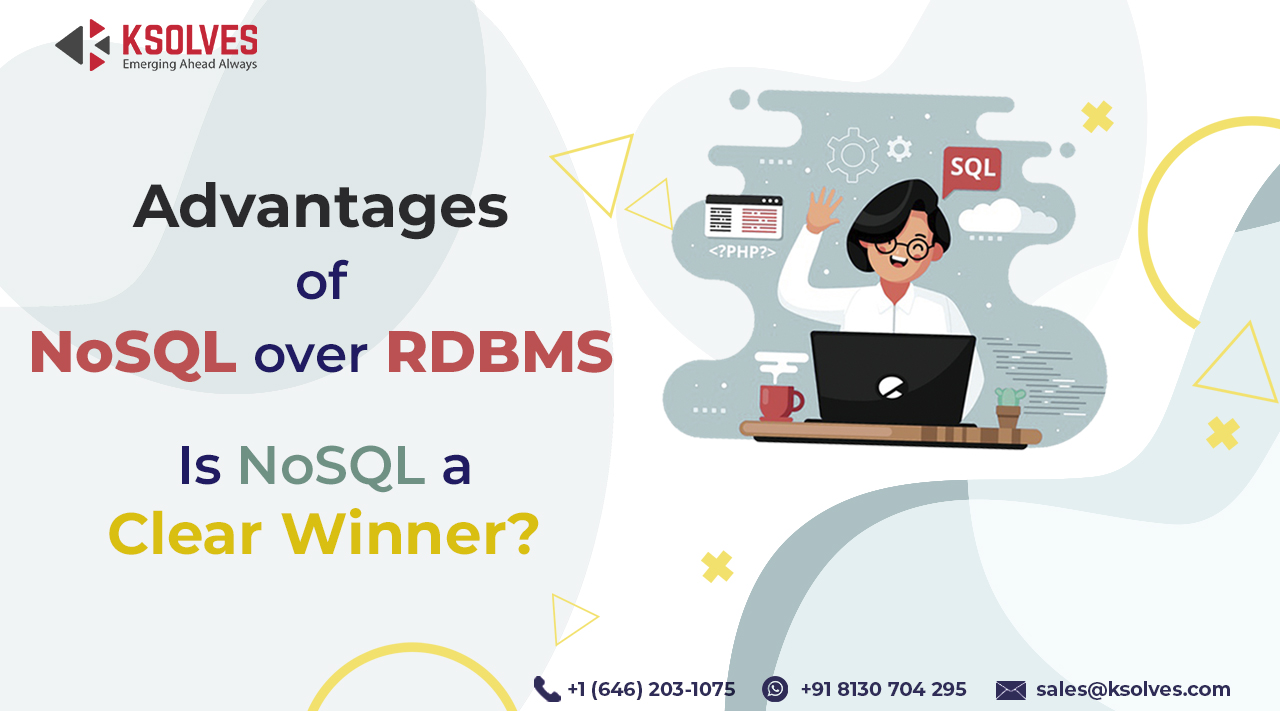Advantages of NoSQL over RDBMS: Is the Former a Clear Winner?
NoSQL
5 MIN READ
October 13, 2020
![]()

Today’s decision-makers are spoilt for choice as the market is congested with so many database management options. While the market is abuzz with Big Data, Database Appliance, etc., the core rivalry is NoSQL & RDBMS. While RDBMS has dominated the market for a quarter of a century, NoSQL is a tempting option that is newer. In this blog, we will look at the advantages of NoSQL over RDBMS.
Reduced Requirement For ETL
NoSQL databases help in the storage of “as is” data. The key-value store facilitates the storing of simplified data structures. On the other hand, document NoSQL databases allow easy handling of a range of nested or flat structures.
A majority of data relocating between systems does so like a message. Usually, the data has one of these formats- a JSON document, an XML document, a binary object made to pass through several layers.
The ability to handle these formats natively in an array of NoSQL databases reduces the amount of code that has to be converted from the source format to the desired storage format. This is known as extract, transform, and load (ETL).
Support for unstructured text
Enterprise systems face the problem of unstructured data. NoSQL databases are adept in indexing unstructured data through an integrated suite of services(like Solr or Elasticsearch) or as a native feature(like MarkLogic Server). This proper handling of unstructured data enhances the value of information by providing the decision-makers with in-depth insights. In addition to that, you can easily extract named entities from directories(like listed places, people, organizations, etc.) by applying search alert actions on data ingest. This allows text data to be thoroughly organized, tagged, and easy-to-be-searched.
Horizontal Scaling On Commodity Hardware
NoSQL databases facilitate partitioning(sharding) of a database across several servers. So, if the data storage requirements surge, all you need to do is buy cheap servers and integrate them into the database cluster. In the case of RDBMS, one has to invest in new and expensive hardware for scaling up.
Adaptation To Changes
Due to the schema-agnostic nature of NoSQL databases, they are very capable of managing change. If the XML message structure changes between the systems, one doesn’t require to rewrite the ETL routines. The indexes allow organizations to utilize data instantly if there is a structural change in documents instead of waiting for a test/rewriting system.
Enough room For Functionalities
Many relational databases support the same features with little or no difference, making them quite similar to each other. In comparison, NoSQL databases are available in four different types: columnar, document, key-value, and triple stores. To suit your requirements, you can choose the one that qualifies for the particular need.
Supports Several Data Structures
A lot of applications require simplistic object storage. On the other hand, some demand highly interrelated & complex structure storage. NoSQL databases lend support to an array of data structures.
- Corresponding data values can be classified in column families.
- In key-value stores, simple binary values, lists, maps, and strings can be handled speedily.
- Any pool of interrelated information can be presented flexibly and combined in triple & graph stores.
- Within document databases, highly complex parent-child hierarchy structures can be managed.
End Note:
RDBMS & NoSQL are great in data management & both are utilized for optimizing and smoothening data storage and retrieval mechanism. Data exchange & interoperability will keep evolving as the databases continue to employ the latest data handling techniques. The Benefits of NoSQL over RDBMS are tilting the balance in favor of the former. Get the best NoSQL services today from the experts from KSolves!
Contact Us for any Query
Email : sales@ksolves.com
Call : +91 8130704295
Read related articles:
Best Odoo Apps to Make your Business Grow Rapidly
What Are The Benefits Of Odoo Ecommerce Themes?
![]()

AUTHOR
NoSQL
Shilpa is the Senior Technical Content Writer at Ksolves. She has a great command over emerging technologies like Big Data, Artificial Intelligence, Microservices, and DevOps. She also has a profound knowledge of Salesforce CRM and loves writing about easy solutions to complex tech issues.
Share with